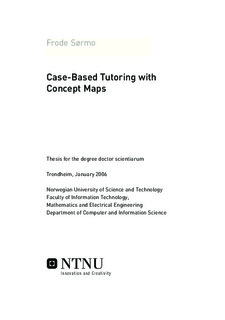| dc.contributor.author | Sørmo, Frode | nb_NO |
| dc.date.accessioned | 2014-12-19T13:30:10Z | |
| dc.date.available | 2014-12-19T13:30:10Z | |
| dc.date.created | 2008-02-29 | nb_NO |
| dc.date.issued | 2007 | nb_NO |
| dc.identifier | 123661 | nb_NO |
| dc.identifier.isbn | 978-82-471-0458-3 | nb_NO |
| dc.identifier.uri | http://hdl.handle.net/11250/249886 | |
| dc.description.abstract | The goal of this thesis is to investigate methods for computerized tutoring support that is adapted to the individual student. In particular, we are concerned with providing such assistance to students solving exercises in domains where a complete or accurate problem-solving model is infeasible. We propose to do this by using concept maps as a means for students to model their own knowledge. Combined with results from earlier exercises, the concept map can form a student model that can be used in exercise selection, conceptualization support, and exercise solving support.
The thesis presents a framework for comparing exercise-oriented intelligent tutoring systems, and uses this framework to describe and analyze earlier systems, as well as our own system, CREEK-ILE. The CREEK-ILE system includes a formalization of a knowledge representation designed to support reasoning with concept maps, and methods for using case-based reasoning with concept maps as student models. A partial implementation of CREEK-ILE designed to support learning of basic Java computer programming is presented. This implementation is used in an experiment to test if students' concept maps, created before an exercise, can be used to predict the students' level of competence on the exercise tasks. The conclusion of these experiments is that although there is a weak correlation, it is not strong enough to serve as a good basis for exercise selection. However, concept maps in student modeling is useful for other tutoring tasks, such as conceptualization support, vocabulary learning and as basis for explanations.
An initial qualitative study on the effect of using inference on concept maps is also performed. This study is done by using the concept maps drawn by students in the experiment, and shows that inference can reveal implicit knowledge in students' concept maps. We demonstrate how this implicit knowledge can be used in various tutoring tasks supported by concept maps, for instance by increasing the quality of concept map similarity measures. | nb_NO |
| dc.language | eng | nb_NO |
| dc.publisher | Fakultet for informasjonsteknologi, matematikk og elektroteknikk | nb_NO |
| dc.relation.ispartofseries | Doktoravhandlinger ved NTNU, 1503-8181; 2008:21 | nb_NO |
| dc.title | Case-Based Tutoring with Concept Maps | nb_NO |
| dc.type | Doctoral thesis | nb_NO |
| dc.contributor.department | Norges teknisk-naturvitenskapelige universitet, Fakultet for informasjonsteknologi, matematikk og elektroteknikk, Institutt for datateknikk og informasjonsvitenskap | nb_NO |
| dc.description.degree | dr.scient. | nb_NO |
| dc.description.degree | dr.scient. | en_GB |
